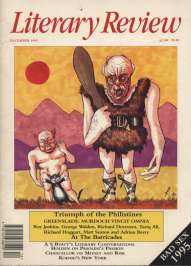Annette Kobak
Whole Societies are in Mourning for their Lives
Men in Black
By John Harvey
Reaktion Books 280pp £19.95
It’s the claim of some books that they will change your life. Men in Black makes no such claim, yet it undoubtedly will if you read it. At its simplest – and the book’s apparently simple title proves to be the doorway to a brilliantly sustained, illuminating and subtle disquisition on the malaise of nineteenth- and twentieth-century English society – you will probably never put on a black garment again, man or woman, without resonating like a tuning-fork with the memory of what you have read. Even to those with keen awareness of dress codes, to put on a black anything will become a statement of previously unimaginable complexity.
As John Harvey warns, ‘Black matters are not clear cut’. Typically, black has been worn by the ‘basic cast of power-dressing: the priest, the prince, the merchant’, and signals mourning, power and money. That’s the simple bit, for its ramifications can spread from sinisterly prolonged mourning (Hamlet, Philip II of

Sign Up to our newsletter
Receive free articles, highlights from the archive, news, details of prizes, and much more.@Lit_Review
Follow Literary Review on Twitter
Twitter Feed
How to ruin a film - a short guide by @TWHodgkinson:
Thomas W Hodgkinson - There Was No Sorcerer
Thomas W Hodgkinson: There Was No Sorcerer - Box Office Poison: Hollywood’s Story in a Century of Flops by Tim Robey
literaryreview.co.uk
How to ruin a film - a short guide by @TWHodgkinson:
Thomas W Hodgkinson - There Was No Sorcerer
Thomas W Hodgkinson: There Was No Sorcerer - Box Office Poison: Hollywood’s Story in a Century of Flops by Tim Robey
literaryreview.co.uk
Give the gift that lasts all year with a subscription to Literary Review. Save up to 35% on the cover price when you visit us at https://literaryreview.co.uk/subscribe and enter the code 'XMAS24'